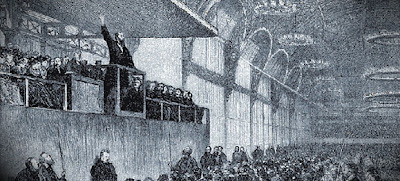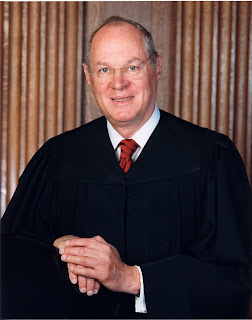 |
| Synod of Dort, 1618-1619 |
Article One: The Gospel
We affirm that the Gospel is the good news that God has made a way of salvation through the life, death, and resurrection of the Lord Jesus Christ for any person. This is in keeping with God's desire for every person to be saved.We deny that only a select few are capable of responding to the Gospel while the rest are predestined to an eternity in hell.
Significantly the "Statement of the Traditional Southern Baptist Understanding of God's Plan of Salvation" begins with an article on "The Gospel." It will be remembered that the Preamble to the document stated that "Traditional Southern Baptist soteriology is grounded in the conviction that every person can and must be saved by a personal and free decision to respond to the Gospel by trusting in Christ Jesus alone as Savior and Lord," and that "Christ is willing and able to save any and every sinner." Accordingly in the First Article of the Statement the authors affirm that "God has made a way of salvation . . . for every person" and that "This is in keeping with God's desire for every person to be saved."
So far, so good. But then the authors assume that the free offer of the gospel is somehow incompatible with the doctrines of election and predestination. "We deny that only a select few are capable of responding to the Gospel while the rest are predestined to an eternity in hell." They list 17 passages of Scripture in support of their position, most of which underscore the Great Commission and the free offer of the gospel.
It should be pointed out that only Hypercalvinists reject the free offer of the gospel. The vast majority of Calvinists whole-heartedly accept the offer because it is obviously biblical and is central to the mission of the church. The Synod of Dort, which explicated what has become known as "The Five Points of Calvinism," explicitly stated that the death of Christ "is of infinite worth and value, abundantly sufficient to expiate the sins of the whole world," and that the promise of the gospel "ought to be declared and published to all nations, and to all persons promiscuously and without distinction . . ." If anyone fails to believe, "this is not owing to any defect or insufficiency in the sacrifice offered by Christ upon the cross, but is wholly to be imputed to themselves" (Second Head of Doctrine, Articles 3,5 and 6).
Does this, then, necessarily preclude any idea of election and predestination? The authors of the Statement evidently think so. As we shall see, however, the Bible explicitly addresses the subject, and quite unambiguously teaches that God chooses those who are to be saved. Calvin drew his theology from such passages as Romans 9 and Ephesians 1, where God's sovereign choice in election is quite clearly stated. Opponents of Calvinism typically either resort to contorted exegesis to rid themselves of the problem, or ignore the passages altogether. One cannot use one scriptural truth to deny another. Sometimes the Word of God is deeper and more complex than our shallow systems of theology!
Specifically the authors of the Statement doe not make allowances for the possibility that God could have complex motives for His decrees – that He could have genuine pity and compassion on His fallen creatures and yet, at the same time, find it necessary for the sake of justice, for some to receive the actual punishment their sins deserve. "What if God, wanting to show His wrath and to make His power known, endured with much longsuffering the vessels of wrath prepared for destruction, and that He might make known the riches of His glory on the vessels of mercy, which He had prepared beforehand for glory . . . ?" (Rom. 9:22,23; NKJV).
If there is a contradiction here, it is not to be traced to any defect in the character of God. Rather, the fault lies with us. We are God's creatures, made in His image, created in original righteousness. Yet we sinned and rebelled against Him. We essentially created the problem, and can hardly blame God for the consequences of our own actions. The question is not, why does God choose to send some sinner sot hell and not others; the question is, why do we persist in our sin?








